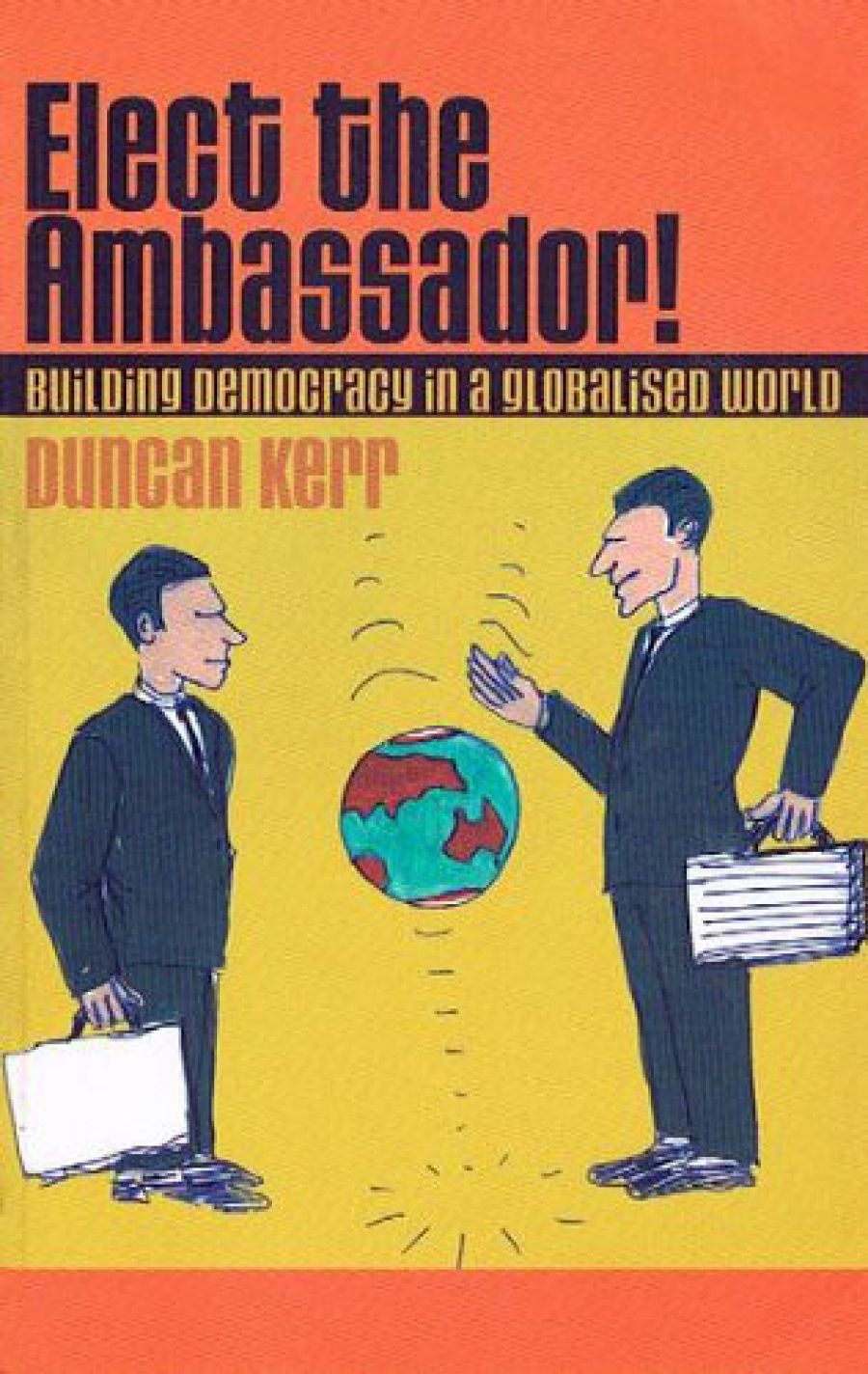
- Free Article: No
- Contents Category: Society
- Review Article: Yes
- Online Only: No
- Custom Highlight Text:
A reviewer’s summary of this book’s first theme could be accused of political prejudice. That is one good reason for preferring its author’s summary:
- Book 1 Title: Elect the Ambassador
- Book 1 Subtitle: Building democracy in a globalised world
- Book 1 Biblio: Pluto Press, $32.95 pb, 194 pp
However right or wrong the rest of the book, those opening words deserve acclaim. No other MP has acknowledged so candidly what the ruling parties actually did to Australia’s economy through the century’s last years.
For Labor’s role, Kerr offers two defences. ‘The Hawke and Keating governments went along with the prevailing economic orthodoxy of their times.’ That’s an odd defence of a party of the Left. But second, ‘they preserved – to a degree unprecedented in comparable countries, with the possible exception of Canada – the key elements of the welfare state’. That defence is fair but deceptive. The Labor government’s health and welfare achievements were indeed admirable. But they were given no sustainable revenue base. They were financed chiefly by cutting other public services and spending the capital proceeds of privatisation. When that windfall was gone the welfare gains would be in danger from whichever party of economic rationalists was governing at the time.
Kerr details the political effects of the rightward shift of economic strategy. All over the world national governments have lost vital powers. So, therefore, have their electors. Democracy is a weak remainder of what it was. Power has passed to transnational corporations and unaccountable international institutions.
Kerr’s second theme is that the change is irreversible.
His third is that we should therefore accept world government and try to democratise it. The main part of the book suggests how we might go about that hard task. The discussion is valuable whether or not the loss of national power is really irreversible. If it’s not, we could imaginably work to strengthen global and national democracy together. Although parts of the text expect large transfers of power to global institutions, other passages see national governments resuming many of their traditional functions with new global support.
Ten proposals end the book. The first would reverse the increase of inequality within and between nations. We should reduce poor countries’ foreign debt and levy the Tobin tax on unproductive capital transactions. Global action should cut tax evasion and halt the ‘race to the bottom’ as nations compete for footloose investment by cutting taxation and shifting what remains of it off business and onto poorer taxpayers. Global agreements should enforce minimum social and labour standards. And we should introduce elements of direct democracy, including the election and dismissal of directors, into the existing global institutions.
Three kinds of dissent from Kerr’s main theme can be expected. He exaggerates the death of national democracy. He underrates its remaining powers if we had the will to use them. And he may underrate the difficulty of democratising the World Bank, the International Monetary Fund, the World Trade Organization, and the United Nations and its agencies. Will China’s government let its people vote for international governors though not their own? Will the US democracy, which allows widespread evasion of its own taxes and won’t pay its UN dues, nevertheless pay taxes set by foreign electors? And so on.
Some Australian politicians may even welcome the programme because it is unlikely to succeed. With the windfall revenues spent, they are dismantling the welfare which briefly compensated the losers from their Right revolution. But they need new excuses – ‘mutual obligation’ has embarrassing implications for hedge funds and corporate executives. How about ‘High tax and national independence as historical has-beens. Our only hope now is to negotiate a global democracy and persuade its electors to vote the Australian poor a share of global revenue?’ Those negotiations need not cost much and could well continue indefinitely, and at attractive foreign locations.
There are good grounds for those and other misgivings. But Kerr knows well the trouble we’re in, and who got us there. His detailed analysis allows for some better national government than his opening and closing summaries suggest. His language throughout is blunt, clear and honest. I can’t remember combining such reservations about a book’s arguments with such high respect for its author, as writer and politician.


Comments powered by CComment